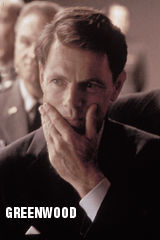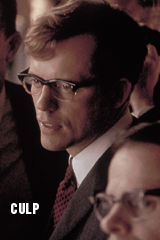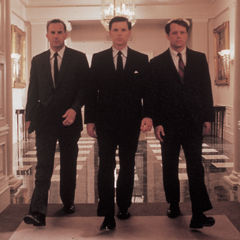Brothers in Arms
Bruce Greenwood and Steven Culp Portray John and Robert Kennedy
in the Cuban Missile Crisis Saga "13 Days"
(c) Boxoffice.com
November 1, 2000
If there's one thing Hollywood hasn't produced in small quantity, it's the near-end-of-the-world disaster flick. Asteroids have been hurled at the earth, malevolent aliens have gleefully obliterated famous U.S. landmarks, Satan has revisited humanity during the Y2K festivities and prehistoric dinosaurs have been brought back to life to menace modern man. Scary sets of circumstances, unquestionably, but nothing compared to what's in store for the big-screen come Christmas time: the Cuban Missile Crisis. Of all the frightening scenarios -- digitally created raptors tearing after children included -- it's hard to imagine that any event could be as truly terrifying as the real-life tale of the two weeks in October 1962, when the world seemed to come within a hair's breadth of nuclear annihilation. At the heart of this drama was U.S. president John F. Kennedy, who, with the guidance of his most trusted advisors -- brother and U.S. Attorney General Robert F. Kennedy and longtime friend and aide Kenneth O'Donnell -- was forced to confront the actions of Russian premier Nikita Khrushchev regarding the Soviet Union's strategic placement of nuclear weapons in Cuba. In history's most perilous game of chicken, the two Cold War enemies faced off over the presence of the nuclear missiles on the communist island. Remove the missiles, demanded President Kennedy of the too-close-to-home set of deadly arms, or the U.S. will enforce a blockade of Cuba and fire on any Soviet ships attempting to enter the island. Now, nearly 40 years since these tense moments passed happily into the pages of history, the story is coming back anew in New Line's upcoming "13 Days." Based on O'Donnell's memoirs, "Thirteen Days" features Kevin Costner as the tough talking, Bostonian presidential aide who provides a firsthand view of the political inner sanctum behind the near-nuclear disaster. While Costner is, of course, the film's star draw, the undoubted center of attention will be the actors rising to the challenge of portraying the Kennedy brothers: Bruce Greenwood and Steven Culp. The special pressure attached to depicting two of 20th-century America's most significant figures wasn't lost on the thesps. Culp tells BOXOFFICE he fully understood the seriousness of becoming involved in such an ambitious project, which in his case meant bringing the tough-as-nails persona of Robert F. Kennedy to life. "You're playing these icons," he says, "And you really have to have a lot of stuff in your bones just to show up, just to walk into the room. You're taking a life at a certain point and putting [forth] an interpretation and trying to portray it as true to the spirit of somebody as possible." Greenwood, too, tells BOXOFFICE that he realized the high risks inherent to a film such as "13 Days" the moment his agent informed him that the role of John F. Kennedy was up for grabs. "Are you kidding?" he thought. "JFK? Forget it. I want to be a target like that? What if I got it? What a nightmare!"
While Greenwood -- who is currently on location in Ireland filming his next project -- jokes that getting in shape is a foreign concept to him (he quips, "I'll put out my cigarette here and grab a Guinness"), both he and Culp admit that they each had to undergo a degree of physical transformation for their respective roles. "I had to shape myself into this wiry Bobby Kennedy body," says Culp. "I'm naturally just a hair taller and a hair broader than Bruce. That was one of the reasons they wanted to see us together in the screen test. They had him in a padded coat and lifts, and I hate to whittle myself down and pretty much spent five or six months in training and had a very strict diet regime." Greenwood, however, says that his metamorphosis into JFK involved concentrating on other areas -- posture and locks, to be exact. "He was in such chronic pain," the actor says of President Kennedy. "If you watch the way he sits, he's always tilted over on one side to take the weight off his back. Once I figured out how I was going to deal with his back pain and that particular kind of stiffness...hair was where we spent the most time. "People generally think of [JFK with] just a tremendously virile thatch, I think, because so many of those photographs [of him show] this great, big tousled shag," continues Greenwood. "[Film hairstylist] Tony Walker toyed around with all kinds of stuff, including letting it come down low. At one point I looked perilously close to Sam Donaldson, so we had to change it." Bad imitations of TV news anchors aside, preparing for the Kennedy roles was no small feat, if the hours of study and research put in by Greenwood and Culp are any indication. "Tons of reading, watching tapes and listening to tapes" is how Culp describes the rehearsal process for RFK. "I like to do a lot of reading on things anyway because that's just the way my mind works. So I did a lot of reading from different point of views...and I found the best accounts were the ones that tried to paint the fullest three-dimensional pictures." Greenwood echoes this sentiment, noting that the subjective nature of memoirs written by various players in the Cuban Missile Crisis emphasized the need to take several disparate sources into consideration. "There's countless volumes written about that period and that incident specifically," he says. "What I found interesting after getting a stack of books up to my belt and reading them was comparing the different accounts. A lot of people were reporting on the same meetings in their books, but of course their perspectives are completely different sometimes. Their take on what the tenor of the room was is often different, so when you put all those together, you can get a pretty good idea of what it was really like." Getting a feel for the general mood of the scenario wasn't the only area of concern for Culp and Greenwood. Besides the "tenor of the room," of obvious importance was capturing the famous tenor of each Kennedy's voice. RFK and JFK's distinct accents and inflections, after all, are the traits that most readily identify the brothers -- any perceived exaggeration or missed nuance seems likely to be the first target of criticism for eager historians and film reviewers alike. Conscious of the difficulty, the actors say that they worked together in an attempt to master each of their Kennedy tongues. "People have this sort of generalized idea of the Kennedy accent," explains Culp. "One thing you find is that [JFK and RFK's] voices are different tonally -- there's a real difference. [Bruce and I] found when we were doing the auditions together, we would start drifting towards each other's voice, so we would call each other up on the phone and do dueling Kennedys." "We worked alone on our accents and then we would get together and talk and try to avoid leaking into one another," says Greenwood. "I tried to avoid having what he was doing seep into me, and he tried the same thing. [An] analogy would be that we each had a flask of our own Kennedy and we kept pouring it and hoping they wouldn't mix." (He modestly undercuts this charming image by adding, "That's not even a good analogy. I can find a better metaphor.")
This shared sense of humor, says Culp, actually helped the working relationship between the two performers. "I think there was a thing that we fell into where we really were older brother/younger brother," he explains. "We kind of fell into that giving each other s -- t thing a lot, which, as far as my understanding, was very much a part of the Kennedy brothers. That was how they communicated, that sort of constant ribbing and cajoling, and we really fell into that very easily. I think there was a certain enjoyment to the fact that we were falling into it and we just kind of kept it going. There was a real camaraderie there." Greenwood shares his friend's sentiment. "[Steven] was great. We worked well right from the beginning. We didn't know each other at all, and ["13 Days"] is a big deal for both of us. We wanted to treat each other with respect, and out of that good things grew." It's a sense of professionalism and regard that both actors readily extend to Costner, the film's star. "Kevin was like the third brother," says Culp. "[He's] somebody who really, really wants it all to be good. He was really focused on the work and how we can make it better." "He was tremendous," Greenwood adds. "It's hard for whatever superlative I use [to express] how he supported us and how he was there at all times and [under] all kinds of circumstances. He was a gentleman and a force for solidarity. I have nothing but respect and admiration for the way he approached this whole project." Costner's deep commitment to "13 Days," is, in fact, well known in Hollywood circles. The actor stuck with the project as it was shepherded through numerous studios and possible directors, until it found a home at New Line and with helmer Roger Donaldson. And while the reasons behind Costner's strong attachment to the script is, for the moment, up for conjecture, Greenwood and Culp shared some of their own recollections and connections to their characters and the Cuban Missile Crisis. Culp says for him, the role of Robert Kennedy, which he previously played in the HBO special "Norma Jean and Marilyn," resonated on a personal level. "The more I researched him, the more I admired him, despite his faults," he says. "A lot of people's views are that he was somebody who never stopped evolving or growing....I know my mom was a real Kennedy person, and I was probably influenced by that. She [died] four years [ago], but they offered me the deal in the screen test on her birthday, so I thought she was pulling strings." For Greenwood, memories of October 1962 hit very close to home -- literally. "When the Crisis was happening, I was in school in [Washington, D.C. suburb] Bethesda, Maryland, which is Ground Zero," he says. "We were doing the drills -- duck-and-cover under the melamine desktops -- hoping the nuclear holocaust would brush by us and leave us unscathed, so we could go home to our cheese sandwiches -- scamper home to the Velveeta after the blast." It's this very sense of doom that Greenwood thinks might appeal to younger moviegoers who have long forgotten -- if they ever even momentarily cognized -- the danger of the Cold War. "You think a Sega game is bad?" he suggest as a possible marketing slogan. "Try reality." Culp, too, is hopeful that "13 Days" will draw a demographically diverse crowd, especially those eager for an inspirational, intelligent plot. "It's about human beings who, in the midst of a crisis situation, become better than themselves," he says of the film, "who surpass who they are, who work together to save the world from possible disaster." And, really -- space aliens, devils and dinosaurs notwithstanding -- who wouldn't want to see humankind saved from itself? "13 Days." Starring Kevin Costner, Bruce Greenwood and Steven Culp. Directed by Roger Donaldson. Written by David Self. Produced by Armyan Bernstein. A New Line release. Drama. Rated PG-13. "Opens December 20." |
DISCLAIMER: This site is a Steven Culp fan site and is not affiliated with Steven Culp, his family or any of his representatives.
Unless otherwise noted, all captures were made by me from videos from various sources. All shows and photos belong to their respective owners.
NO COPYRIGHT INFRINGEMENT INTENDED!
© 2004-2022 SConTV.com and Steven-Culp.com
Unless otherwise noted, all captures were made by me from videos from various sources. All shows and photos belong to their respective owners.
NO COPYRIGHT INFRINGEMENT INTENDED!
© 2004-2022 SConTV.com and Steven-Culp.com


